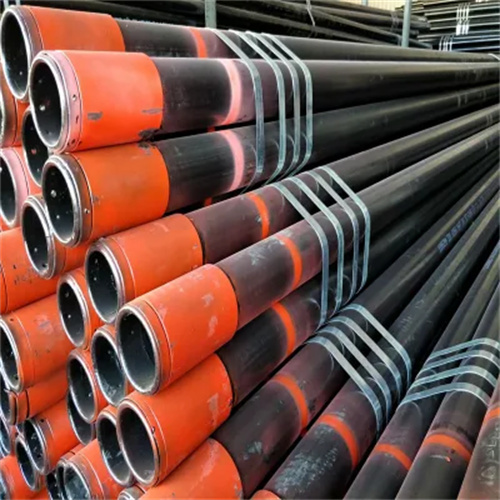Table of Contents
Avantages de l’utilisation de tuyaux de cuvelage sans soudure pour champs pétrolifères dans les opérations de puits de pétrole
Comparaison des qualités API5CT J55/K55/L80/N80/P110 pour les tubes de cuvelage de puits de pétrole
La qualité P110 du tube de tubage est la qualité d’acier la plus résistante au sein de la spécification API5CT. Les tubes de tubage P110 sont traités thermiquement et trempés pour obtenir leurs propriétés mécaniques élevées, notamment la solidité, la ténacité et la résistance à la corrosion. Les tubes de tubage P110 sont couramment utilisés dans les puits soumis à des conditions de pression et de température très élevées, où le train de tubage doit résister à des charges et des pressions extrêmes.
En conclusion, le choix de la qualité des tubes de tubage est un facteur important à prendre en compte lors de la conception et de la construction d’un système pétrolier. ou bien de gaz. Chaque qualité de tube de tubage conforme à la spécification API5CT offre des propriétés uniques et convient à différents types de puits et conditions d’exploitation. En comprenant les caractéristiques de chaque qualité, les opérateurs peuvent sélectionner le tube de tubage le plus approprié pour leurs besoins spécifiques en matière de puits, garantissant ainsi une extraction sûre et efficace du pétrole et du gaz du réservoir.
Oilfield casing pipes are an essential component in the drilling and extraction of oil and gas. These pipes are used to line the walls of a wellbore to prevent the collapse of the hole and to ensure the smooth flow of oil or gas to the surface. When it comes to choosing the right casing pipe for a particular well, the grade of the pipe plays a crucial role in determining its performance and durability.
One of the most commonly used grades of oilfield casing pipes is API5CT, which stands for American Petroleum Institute Specification 5CT. This specification sets the standards for the manufacture of casing and tubing used in the oil and gas industry. Within the API5CT specification, there are several grades of casing pipes available, including J55, K55, L80, N80, and P110. Each of these grades has its own unique properties and is suitable for different types of wells and operating conditions.
The J55 grade of casing pipe is the lowest grade within the API5CT specification. It is primarily used in shallow wells with low pressure and low to moderate temperatures. J55 casing pipes are known for their good weldability and are often used in wells where casing string design flexibility is not a major concern. However, due to its lower strength and corrosion resistance compared to other grades, J55 is not recommended for use in high-pressure or high-temperature wells.
The K55 grade of casing pipe is similar to J55 in terms of its chemical composition and mechanical properties. However, K55 casing pipes are heat-treated to improve their strength and toughness, making them more suitable for use in moderate to high-pressure wells. K55 casing pipes are also more resistant to corrosion than J55 pipes, making them a better choice for wells with corrosive environments.
The L80 grade of casing pipe is a medium-strength steel grade that is commonly used in wells with moderate to high pressure and temperature conditions. L80 casing pipes are heat-treated to improve their mechanical properties, including strength, toughness, and resistance to corrosion. L80 casing pipes are often used in wells where high casing string design flexibility is required, as they can withstand higher loads and pressures compared to J55 and K55 pipes.
The N80 grade of casing pipe is a higher-strength steel grade that is suitable for use in wells with high pressure and temperature conditions. N80 casing pipes are heat-treated and quenched to improve their mechanical properties, making them more resistant to deformation and failure under extreme operating conditions. N80 casing pipes are also more resistant to corrosion than lower-grade pipes, making them a popular choice for wells with corrosive environments.

The P110 grade of casing pipe is the highest-strength steel grade within the API5CT specification. P110 casing pipes are heat-treated and quenched to achieve their high mechanical properties, including strength, toughness, and resistance to corrosion. P110 casing pipes are commonly used in wells with very high pressure and temperature conditions, where the casing string must withstand extreme loads and pressures.
In conclusion, the choice of casing pipe grade is an important factor to consider when designing and constructing an oil or gas well. Each grade of casing pipe within the API5CT specification offers unique properties and is suitable for different types of wells and operating conditions. By understanding the characteristics of each grade, operators can select the most appropriate casing pipe for their specific well requirements, ensuring the safe and efficient extraction of oil and gas from the reservoir.

